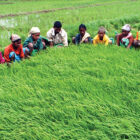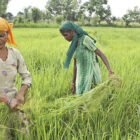Will there be a farmer representative on the new avatar of the Planning Commission and not a farm economist who is good with figures but has never ever felt the pain of being a farmer?
At the turn of the 14th century, Alaud-Dīn Khaljī, faced a difficulty. Limited revenues had obviated the possibility of increasing salaries of a large standing army and administration. The only option was to reduce prices of essential commodities and provisions. Economists today refer to similar action in current conditions as taming inflation. Khaljī did so by controlling prices, appropriating and regulating supplies. Market, traders and merchants were placed under the controller of markets. He managed to hold things together for a while but everything fell apart beyond a point.
As India moves away from market restrictions to resolve similar problems, it has much to learn from Khaljī, who was otherwise a ruthless administrator and reformer. Even the idea of government procuring, storing and transporting grain – through the Food Corporation of India (FCI) – seems to have originated from his policies of filling the ‘royal’ stores with grain that would be sold in times of scarcity at regulated prices. Khaljī had realized that the key to increased prosperity lay in not allowing wages to increase while reducing prices to enable people to afford more. UPA II wrongly believed that an increase in wages could offset increased inflation or even food inflation. How wrong it was is evident from the electoral drubbing that it received.
The similarities do not end there even though times have changed. The problems persist. The very problem that has confronted India for the last five years now confronts the current Indian Prime Minister. The question is if the regime of routine responses will be broken. Farmers’ Forum has some thoughts on strategic solutions. Rather than following a 600-year old archaic process, it is suggested that the FCI be broken into three dynamic entities: one to procure and transport, one to store and the third to distribute grain. This will reduce wastage and lead to better accountability and delivery. Politicians and economists, however, refuse to learn from history, which is why they make the same mistakes, solve the same problems year after year, decade after decade and even centuries after.
Yet the writing is on the wall. The next Rabi crop report needs to be worked upon but no sharp minds seem to be working on it. The increase in the minimum support price (MSP) — that too for a few crops — was no more than four per cent, much less than the rate of inflation or the increase in consumer price index (CPI) and lesser than the increase in cost of cultivation, especially in a year of deficient rainfall. The same opposition, which would cry foul every time a minuscule MSP increase was announced, is quietly pronouncing similar policies now that it is in power. The fact remains that the support price offered to farmers in India for rice and wheat, for example, is much less than that offered in much of the world; as low as one-third the prices elsewhere at times.
That brings one to the issue at hand at the WTO. Farmers’ Forum has highlighted several problems but has not discussed that the calculation of production and support is quantified in rupee terms. The rupee has got devalued considerably; by 300 per cent since 1990. Had this been quantified and designated in dollar terms, India would not be looking for a reprieve at WTO. Curiously, India has not notified WTO on its production and subsidies for 10 long years. India’s representatives at almost all WTO negotiations through the last two decades have been much junior officers than those representing other countries. India was cajoled into signing the peace clause and the government claimed it as a victory.
On the one hand the Food Security Act provisions mandate that India continues to procure and store a large quantity of grain and now also physically deliver it to a large section of the population. On the other hand at WTO at Bali, India agreed to a four-year ‘reprieve’ to undo that very process. Why the UPA failed to notify WTO or how it hoped to reduce the size of the programme in four years defies explanation. With a clear majority in parliament, the BJP is free to do what it wills but it will not be free from the consequences of the choices it makes. Young Indians starting their careers in an environment devoid of hope and opportunity must have an alternative to surviving on the dole if they are to steer clear of populist politics.
There is also the major concern about who the policy influencers will be. It is important that the Prime Minister ignores the chattering classes on television panel discussions since they do not represent the largest section of society. Neither should the Prime Minister be moved by the adulation of industry associations, which have never opposed a budget speech in living memory. They only start finding fault when a change in government is imminent. Only those Indians who neither follow the budget telecast nor invest in stock markets or pay taxes will be the decisive factor five years down the line.
A final point: the Prime Minister has, in his wisdom, decided to disband the Planning Commission. Will there finally be a farmer representative on board the new authority rather than a farm economist who is good with figures but has never ever felt the pain of being a farmer?




